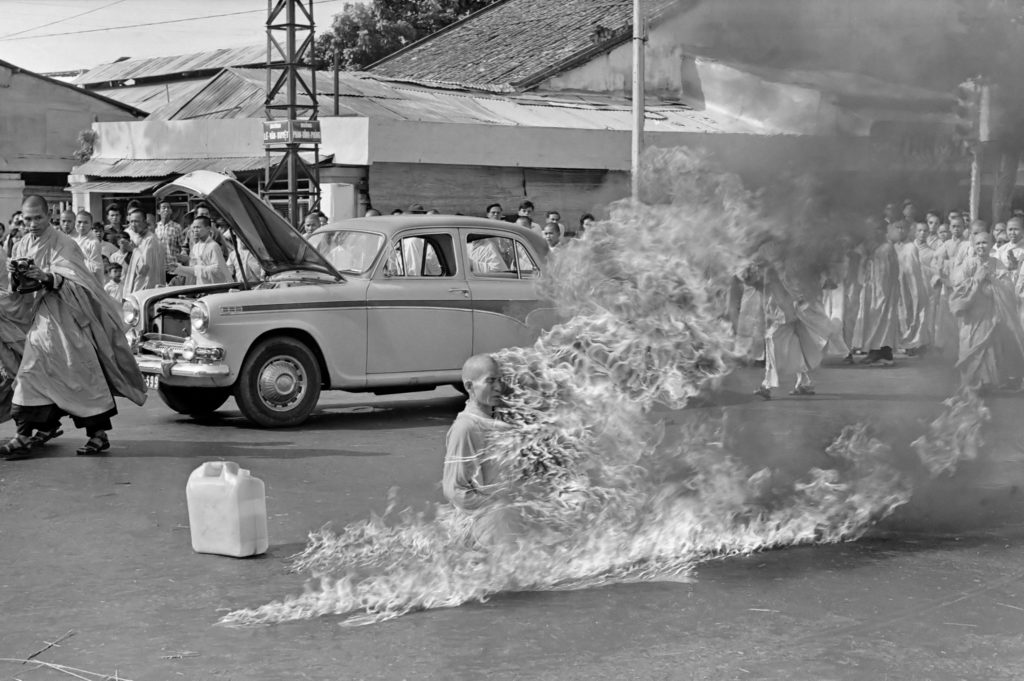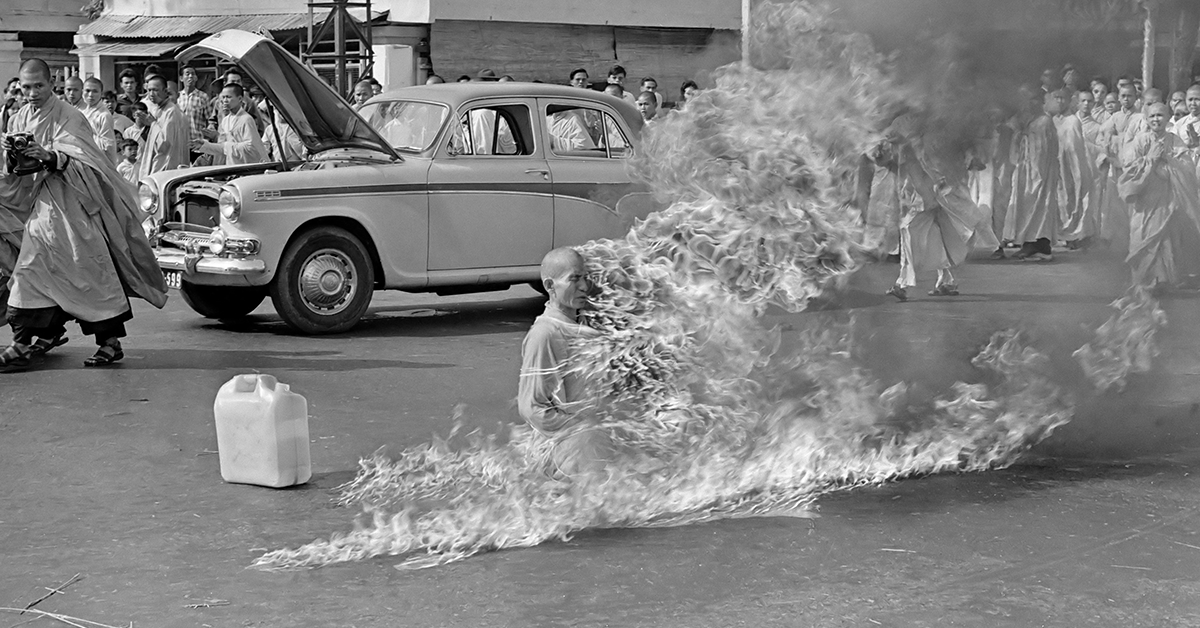THE BURNING MONK
MEDITATION ON A VISUAL
ABSTRACT – How does the photograph of Thich Quang Duc‘s self-immolation resonate with us today? Is there any wisdom that could be applied to the global upheaval we are currently experiencing?

by Nik List
1 — THE BURNING MONK
On June 11th, 1963, the Vietnamese Buddhist monk Thich Quang Duc set himself ablaze at a busy road intersection in Saigon as a protest against their persecution by the South Vietnamese government. Malcom Browne’s photographs of this event circulated around the world, drawing attention to the situation, and winning him a Pulitzer prize. “No news picture in history has generated so much emotion around the world as that one” stated JFK.
How does this image resonate with us today?
As a young monk, Thich Quang Duc had probably not pictured his monastic life ending in flames at a street corner. But on June 11th, 1963, he was acting on something. A sense of duty? A calling? An intuition that this was what the situation required of him? Who knows?
Cut to: present day – Is our current, global predicament any less critical than Thich Quang Duc’s?
The house is on fire, says Greta Thunberg. We have now entered the decisive decade, a period of planetary upheaval and irreversible change.
As we look at the picture of Thich Quang Duc from our vantage point, one must ask the burning question: what is required of us in this critical moment?
2 — MEMENTO MORI
Before considering our role within this global shift, we could start by evaluating the meaning we attribute to our daily lives – provided there is any meaning at all to attribute.
Where does one find meaning in a secular world during challenging times?
😁 Meet the existentialists. 😁
Extracting meaning from a meaningless world is a challenge the existentialists take seriously. Life is hard. But, as Nietzsche said, He who has a why to live for can bear almost any how.
For an existentialist, an individual’s primordial responsibility is to figure out his/her creed, and then live by it. How do you know if your creed is right? Well, you don’t. You just have to take the plunge and see for yourself.
Where to start? 🤔
Start by keeping death in mind at all times. Take daily walks in cemeteries. Leave a skull on your desk, next to your laptop. Remember Tyler Durden in Fight Club? — This is your life, and it’s ending one minute at a time. The ticking clock provides a strong incentive to get up and go do something with the little time you have.
Storytellers know that the ending dictates the ‘message’, the punchline of a story. By keeping that ending in mind, we can infuse our daily life with the meaning we wish to attribute to it, and thereby get an answer to the initial question: what is required of us in this crucial moment?
3 — HOUSE ON FIRE
Welcome to job interview course 101 for undergrad students. Today’s question: ‘What do you want to do with your life?’
I want to build a successful business; I want to get married, have a family and raise children; I want to have a fulfilling job; I want to gather a following on social media and become famous; I want to move abroad; I want to — etc.
Do you notice a common thread?
A pervading individualistic mantra?
What do you want to do with your life? > chimes with > What can the world do for me?
But here’s the thing.
If Greta Thunberg is right, and the house is de facto on fire, how relevant does that make one’s individual desideratas? What degree of selfishness are we allowed in critical times?
What is required of us in this critical moment? implies a shift. From individualism to, well, something else. From perceiving ourselves as separate, selfish beings, encapsulated in physical bodies, to a holistic perspective. Theories such as Gaia remind us of an underlying unity behind the illusion of separation. The question requires shifting from the solo player ‘I want’ to the needs and the unity of the team.
What can the world do for me? > TO > What does the world need?
One tweak, and the whole perspective shifts.
4 — ONE WITH THE MOMENT
Let’s now tweak the question some more:
What does the world need? > TO > What does this moment require?
Isn’t that what Thich Quang Duc was doing? Responding to the moment?
Maybe meaning was never meant to be found on a conceptual level, or in some far-fetched life narrative. Maybe the rational mind isn’t the best tool for the job.
Instead of focusing on the action, meaning could be derived from the way in which the action is carried out. Becoming one with the situation, one with the moment.
This is good news. No need to set yourself on fire or read Schopenhauer. Meaning can be found here, in the depth and the simplicity of this moment, doing whatever you are doing — changing a baby’s diaper, grocery shopping, talking to a friend, typing an email, or drinking a cup of coffee.
Remember:
Existential dread is only a thought.
Cats don’t need existentialism. Neither do the cells of the body.
Breathe. Step out of the mind.
Bring your attention back to this moment, and give it your all.
5 — THE MESSAGE
As Gandhi was getting on a train leaving the station, a man ran up to him with a paper bag, asking for a message. Gandhi took the bag and scribbled these words: My life is my message.
My life is my message — that’s probably something the existentialists would agree with.
Rest in peace, Thich Quang Duc.
Your message carries on.

